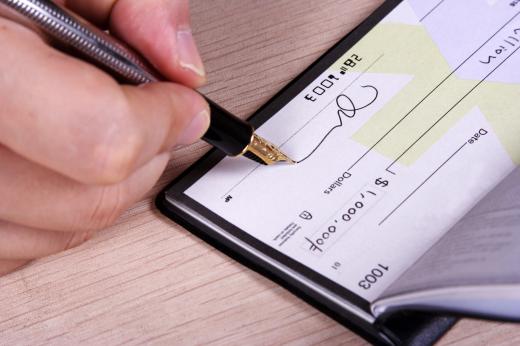When a negotiable instrument such as a personal check is endorsed by the person who holds the title to the instrument and the payee's name is not spelled out, it is known as a blank endorsement or an endorsement in blank. When someone uses a blank endorsement, the instrument is payable to whoever presents it. In the classic example of a check with a blank endorsement, anyone can walk into the bank and cash the check, since it has the signature of the accountholder on it, but is not made out to a specific payee, or is made out “payable to bearer.”
With a blank endorsement, the instrument could be said to be a bearer paper. Bearer papers are payable only to the person in possession. With a blank endorsement, someone needs to present the instrument in order to receive payment, transfer of title, or other benefits which might be conferred by the document.

Some types of negotiable instruments may be commonly presented in the form of a blank endorsement for purposes of facilitating the transfer of ownership smoothly. There are also other settings in which the ability to endorse something without indicating a specific payee can be useful. Such instruments should be carefully guarded, however, to ensure that they do not end up in the wrong hands, as anyone can cash them.
There are a number of reasons why people might use a blank endorsement. There may be cases, for example, in which the payee is not yet known, and someone uses a check to create a bearer paper which can be used by the payee to access the funds. For example, parents leaving several older children in charge of a household might leave the children with a check with a blank endorsement which can be cashed by any of the children in case there is an emergency and they need money.
Blank endorsements are not the same thing as blank checks. In the case of a blank check, the amount payable is left blank, allowing someone to fill it in a later time. People very rarely write blank endorsements which are also blank checks, and such a document could potentially become a serious liability if it ended up in the hands of the wrong person. On the other hand, a check made out to a specific payee with the amount left blank can be useful in some settings.
Ever since she began contributing to the site several years ago, Mary has embraced the exciting challenge of being a SmartCapitalMind researcher and writer. Mary has a liberal arts degree from Goddard College and spends her free time reading, cooking, and exploring the great outdoors.
